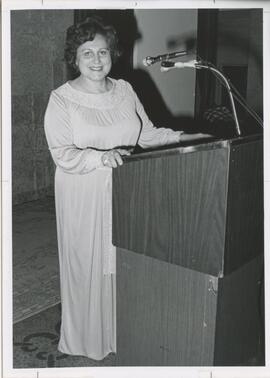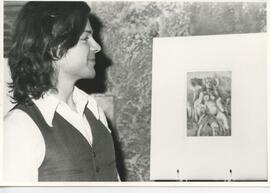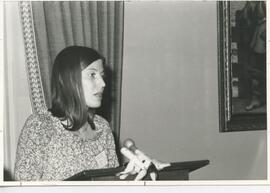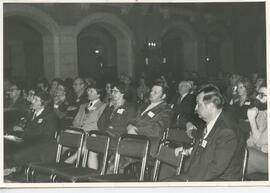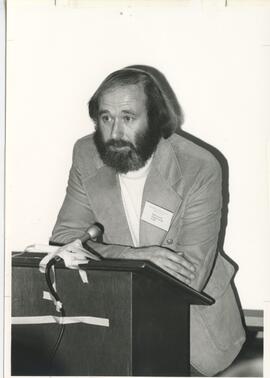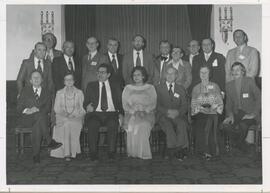This item contains recordings from the Second Banff Conference on Central and East European Studies.
Presentation by Mr. Petr Czarnowsky: Eastern Europeans, despite their proportion of the population, came to form a large number, often over 50% of ethnic associations in Alberta. This includes ethnic organizations, arts organizations, and linguistic schools. Policies of multiculturalism have helped to form these figures, but have had the unforeseen consequence of adding to confusion about Eastern European ethnic groups on the part of students and teachers alike.
Presentation by Mr. Joanna Mateko on the problems already being faced in the study of Poles. She came from Poland associated with the Polish Academy of Sciences in Warsaw for 15 years. She did work in the field of Polish history, having published numerous articles and co-author of bibliographies that were compiled by the Polish academy of sciences. She does her research on the Poles in Alberta. A problem that exists in the study of Poles is the inaccuracy of academic and official documents pertaining to Polish settlement in Canada, and the difficulty in unearthing accurate depictions and statistics of Polish settlers, and Slavic settlers more generally. This can be derived from a lack of knowledge from Canadian officials, and a lack of consciousness amongst many Slavic groups, particularly the Poles and Ukrainians.
Presentation by Mr. John Sokolowski, a graduate student in the department of Slavic Languages, his first graduate program was as a Classicist. He does work on the Russians and Belarussians. He started his work on the East Slavs, the Russians, Belarussians, and Ukrainians in Alberta. They no longer work on the Ukrainians as so much work has been published. They started their study with the Russians and Belarussians, they hope to determine an accurate number of people of Russian and Belarussian origin in Alberta. Contention on the accurate number of Russians and Belarussians in Canada, as the definition of Russian has changed over time, with many early documents associating many non-Russian ethnic groups as Russian. Dynamics have changed with census records over the years, which still continue to be unreliable. There is thought to be far more Belarussians in Canada than official census documents would suggest.
Presentation by Mrs. Dr. Yermilla Horna University of Calgary Department of Sociology. Dr. Horna was educated in Prague and Bratislava came to Canada in ’58, taking part in the project doing the history of the Czechs and the Slovaks. She got a grant for the study of patterns of adjustment of Czechoslovaks, the so called refugees of 1968-1969. The study focused on pre-1968 settlement of Czechoslovaks in Canada to figure out if incoming refugees had a previous basis to go off of, or had to ‘start from scratch’. Research found majority of Czechoslovaks came to Alberta as miners, farmers, or other labourers, mostly from Slovakia. Greatest wave of Czechoslovak migration prior to 1968 came in 1885.
Presentation by Mr. Kostash: Talks about the function of universities. Talks about how East European and Soviet Studies at the university follows the same functions. Mentions that one who takes particular focus on the East European courses offered by the University can find themselves being skilled and knowledgeable scholars. Initiatives by professors at the university to make sure students in the field go out to the ethnic communities to get a feel for how they are. Talks about the importance of community approval and funding for new programs. Stresses transparency of activities in programs as it relates to the community.
Presentation by Mr. Duruviches, a member of the Lithuanian community, and President of the Baltic Society: Discusses the contention with the label ‘Soviet’, coming from Lithuania, and the history Lithuania has with the Soviet Union. The importance of having a place such as a University to study one’s heritage. Expects from the University that it is kept in mind that although their issues are similar at the moment, that Baltic peoples are not Slavic peoples.
Presentation by Dr. Bergin from the Faculty of Education: has a strong interest in Mennonite culture. Difficulties because of mixed loyalties on representing different groups; particularly the Mennonites, who aren’t easily identified by typical visages.
Presentation by Dr. Sukoversky: the definition of a collection, and that professors start collections. Students can start collections too. Ethnic groups can start collections.
Presentation by the Chairman of Edmonton Historical Board
Presentation by Mr. Kistner: Wasn’t prepared to present but is talking from the perspective of a foot soldier. He is Baltic German born in Tallinn Estonia. Talks about how maps often forget about the islands of Estonia. Baltic Germans is a very small group. It’s worthwhile for even very small groups to write their history and preserve their heritage. In doing work there’s lots of assistance needed, time, and footwork. Being a small group has its advantages, no need for sampling.
